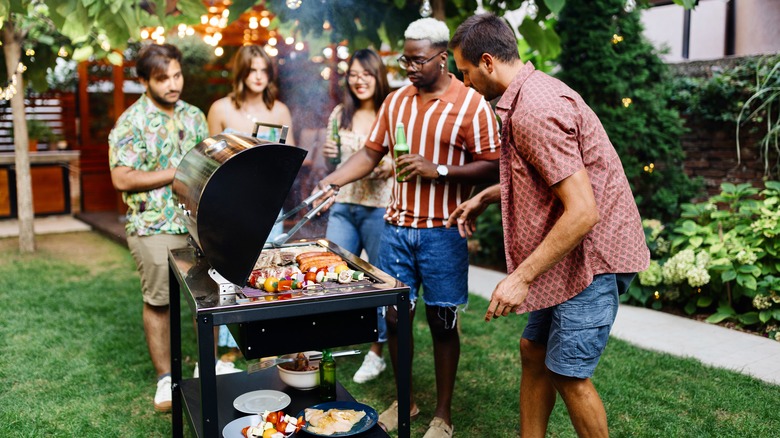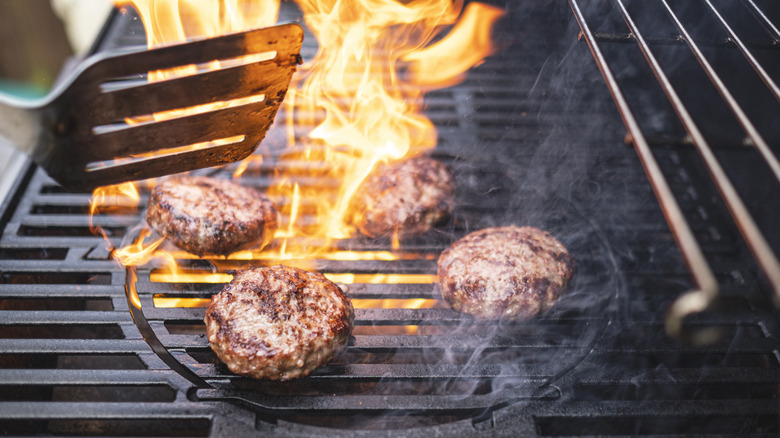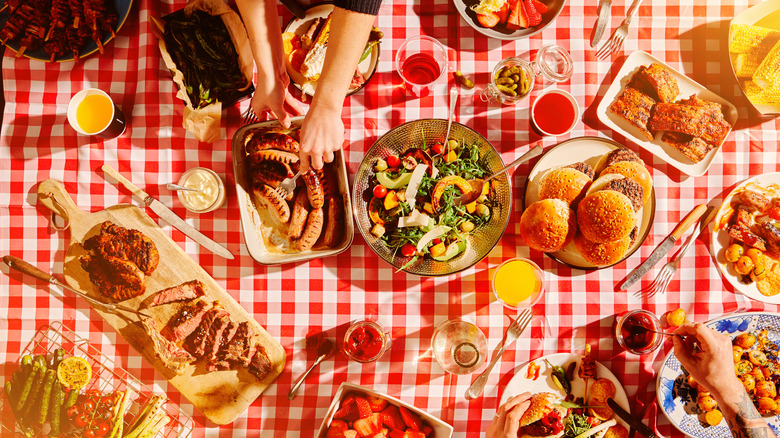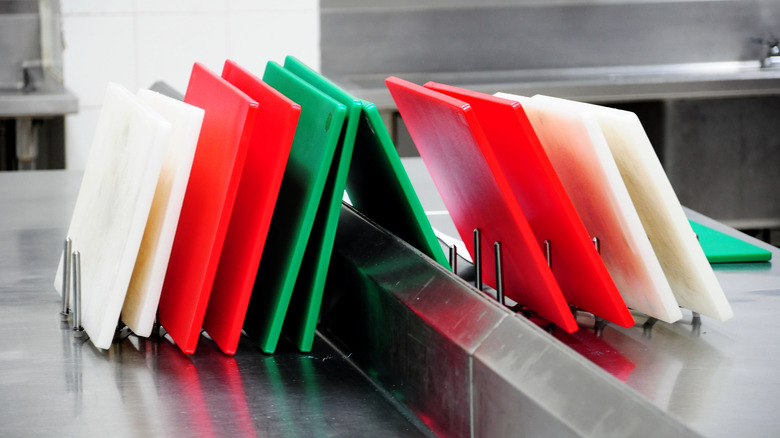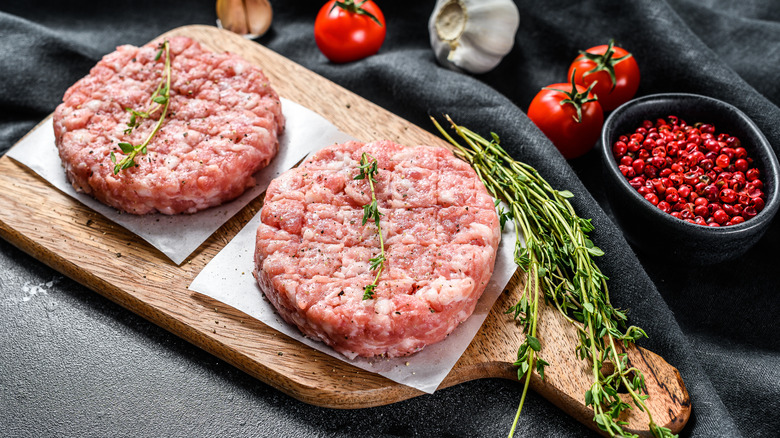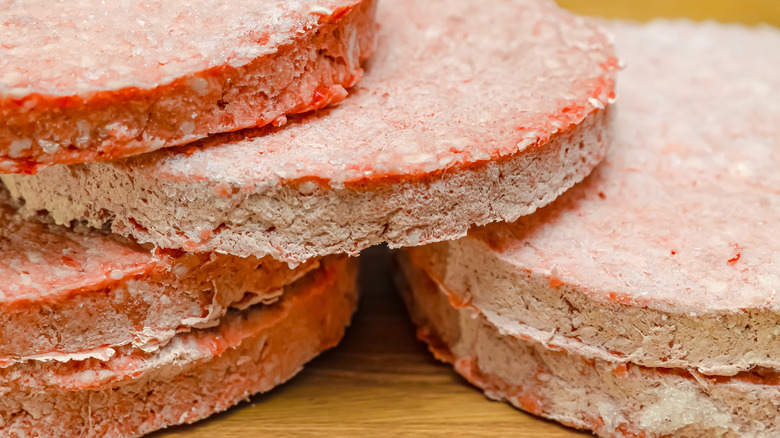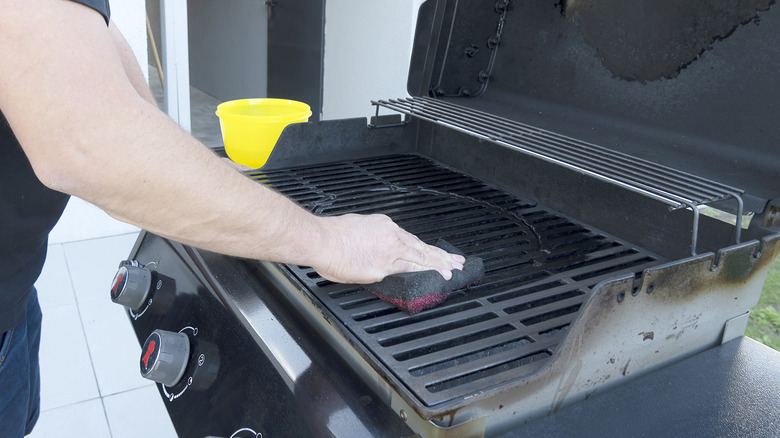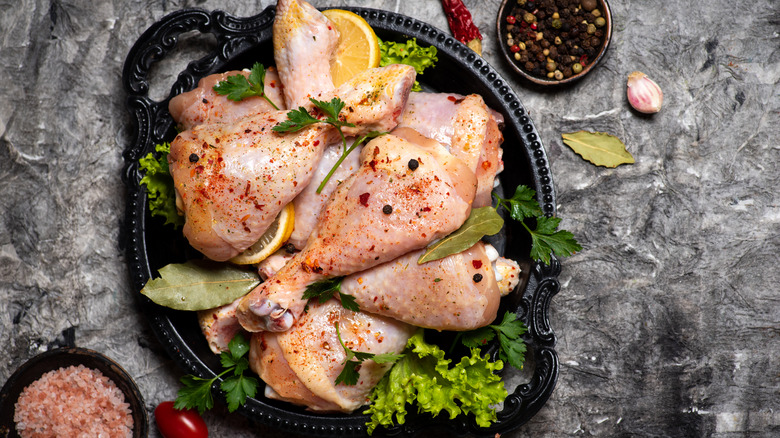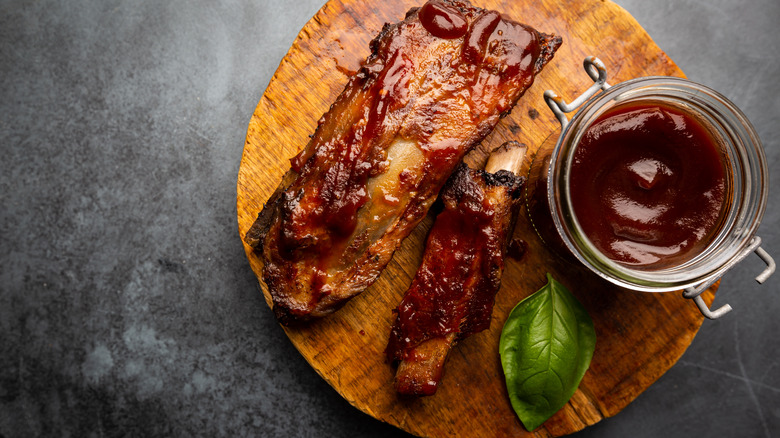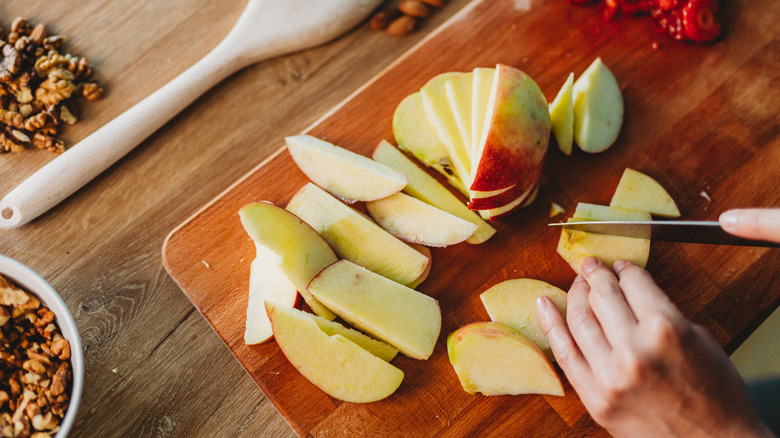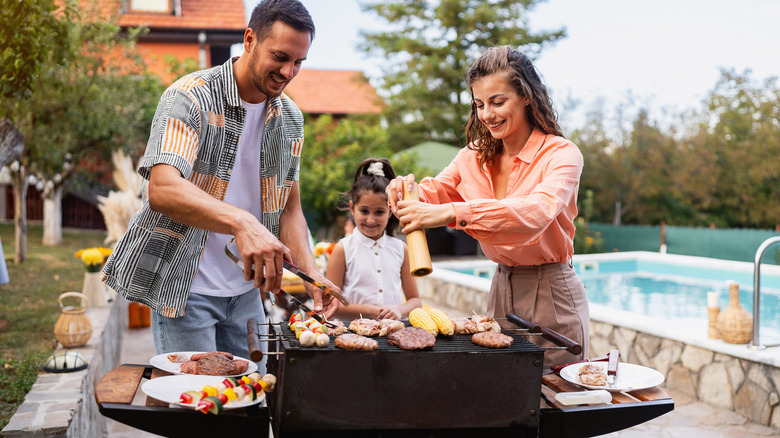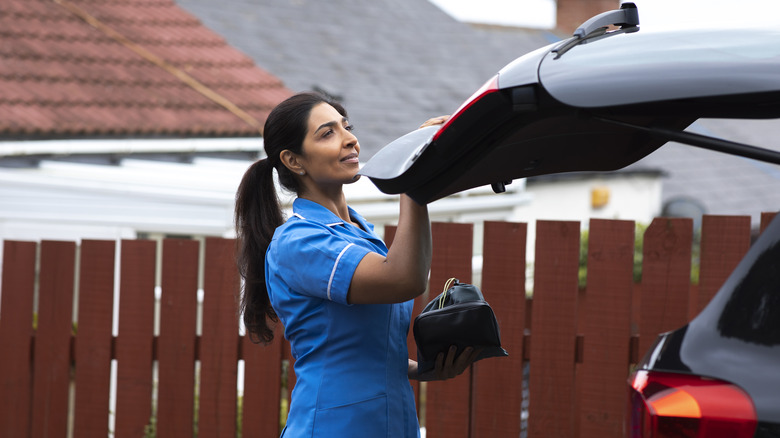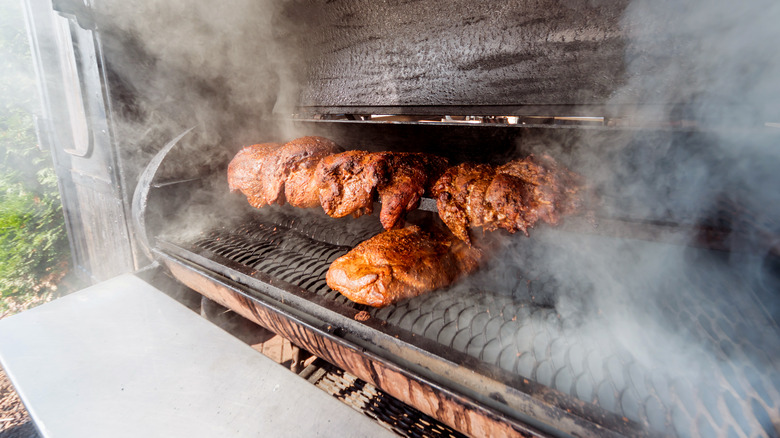12 Food Safety Mistakes That Could Ruin Your Summer BBQ
Summertime brings warmer weather, trips to the beach, and gatherings around the pool. Summer is also a great time to host a barbecue. Celebrating a beautiful weekend by firing up the grill to cook some burgers, hot dogs, ribs, and more can help you share a special time — and delicious food — with those you care about.
Many people worry about rain ruining their summer BBQs. However, there is another threat that you might be overlooking: food safety. No one plans to purposefully contaminate the food they serve their guests with germs and bacteria. However, without proper planning and correct food handling, it's more common than you may think. If you want your guests to leave your picnic with fond memories — and not food poisoning — then keep reading to learn more about the top food safety mistakes that could threaten your summertime BBQs and cookouts.
Undercooking the meat
Undercooking the meat is a surefire way to send your guests home with a foodborne illness. Many amateur grillers consider themselves experts in cooking a perfect burger and judge when chicken legs and other meats have are done based on how they look. However, the USDA points out that assessing doneness based on firmness or appearance is an unsafe practice. Even if something looks done on the outside, the inside may still be raw or undercooked.
Before removing from the grill, always use a food thermometer to confirm that the meats are fully cooked. Burgers, steaks, and other cuts of beef, along with lamb and pork, should all reach a minimum internal temperature of 145 degrees Fahrenheit to be considered safe to eat (along with giving them an additional 3-minute rest). If you're cooking chicken on the grill, it must reach an internal temperature of 165 degrees Fahrenheit to be safe. If you're worried about missing out on socializing with your guests by standing over the grill, consider looking for a wireless meat thermometer that can send alerts to your phone when food items have reached the set temperature.
Leaving items on the picnic tables for too long
One of the biggest mistakes you can make with pasta salad, potato salad, and your other BBQ side dishes is leaving them sitting out on the picnic tables for too long. Take steps to keep foods out of the danger zone, which is the temperature range between 40 and 140 degrees Fahrenheit where bacteria multiply very rapidly.
The temperature of perishable items can increase rapidly when they are left out of the refrigerator for too long. For this reason, you shouldn't leave items sitting out for more than 2 hours. If your BBQ is on a hot day when the temperature is at or above 90 degrees Fahrenheit, then items mustn't be left out for more than 1 hour. To apply this rule to your summer BBQs, avoid setting out the side dishes and condiments until just before the foods will be coming off the grill. Even if your guests are lingering and chatting after the meal, take a few minutes to put any leftovers back in the fridge before their safety becomes compromised.
Not using separate cutting boards
Cross-contamination is a serious concern when handling raw meat. Even if the raw burgers or pieces of chicken themselves don't come into contact with other food items, they can still pose a threat. Many people don't take necessary precautions to limit cross contamination with cutting boards. For example, if you used a cutting board to cut up chicken for kabobs or form your burgers, you shouldn't use the same cutting board to cut the potatoes for the potato salad or fruit for the fruit salad.
This is especially true if you don't wash the cutting board between uses. However, even with washing, it is still recommended to use a separate cutting board for raw meat, seafood, and poultry. Bacteria from these proteins can remain on the cutting board or get trapped in a scratch. There can still be traces of the bacteria even if the board is cleaned, which could transfer to other food items. If you want to avoid giving your guests a side of food poisoning along with their main course, aim to use separate cutting boards at your next BBQ.
Using the same utensils for cooked and raw food
Another mistake that can result in cross-contamination is using the same utensils or platters to serve the cooked meat that you used to prepare it when it was raw. Think about the last time you cooked burgers on the grill. You probably brought the patties outside on a platter or large plate and used a spatula to transfer them to the grill.
Once the burgers had finished cooking, did you use the same spatula to remove them from the grill or put them back on the same platter that held them when raw? If so, you've identified a mistake you'll want to remedy before your next BBQ. Any platters or utensils that touched the raw burgers must be cleaned or replaced before coming into contact with the crooked meat. Otherwise, the bacteria from the raw burgers will transfer from these items onto the cooked burgers or meat, potentially resulting in a foodborne illness for you or your guests. If you're grilling at home, it is easy to wash platters and utensils or pull a clean set out of the cabinets. However, if your BBQ will is at a public park or a campground, cleaning these items will be more difficult. Be prepared with some extra platters to ensure you don't inadvertently threaten your friends' and family health and safety.
Defrosting meat outside before the BBQ
We've all made the mistake of failing to plan ahead and take the burgers or chicken out of the freezer ahead of time. It can be tempting to bring the meat for your BBQ outside on a warm day so it will defrost and be ready to cook before your guests arrive. Unfortunately, this is not a safe way to defrost meat. Remember the temperature range between 40 and 140 degrees Fahrenheit which is referred to as the danger zone? If you leave meat sitting outside — or even on the kitchen counter — to defrost, will likely enter this danger zone. The outside will defrost more quickly than the frozen center. As the center is still thawing, the outer sections will warm up too much, making bacteria more likely to multiply.
Instead, try to plan ahead and take items out of the freezer the night before to defrost them in the refrigerator. If life happens and you forget to do so, all is not lost. You can thaw frozen foods in cold (never hot) water. Put them in a leak-proof plastic bag or container and submerge them in cold water, replacing the water about every half hour to make sure it doesn't get too warm. Another option is to thaw food in the microwave. However, this increases the chances that the meat will not cook evenly.
Forgetting to clean the grill before firing it up
Whether you're getting ready to grill lobster tails, burgers, or chicken thighs, be sure to clean your grill grates before heating them up. Dirty grates can hold bacteria from the traces of food left behind. This bacteria can then transfer to the new food items you're cooking, increasing the chances that someone will wind up sick from the BBQ. What's more, dangerous carcinogens can also build up on dirty grill grates. These carcinogens can also transfer to the foods you're grilling, again putting the health of your guests at risk.
Keeping your grill grates clean can help improve the taste of the items you cook. With clean grates, no old residues can alter the flavor of the meats or veggies you're preparing. Keeping your grill clean can also help extend its lifespan. Overtime, food residue on the grates can lead to corrosion and rusting. When you take good care of your investment it's less likely you'll need to purchase new parts for the grill — or even an entirely new unit.
Leaving meat on the counter to marinate
There is a lot you need to do if you've hosting a BBQ. If you'll be serving chicken, steaks, or kabobs, one of those many tasks may be marinating the meat. Whatever you do, don't make the mistake of leaving the meat out on the counter to marinate. When you leave meat marinating out on the counter, you're once again increasing the changes that bacteria will grow. As it sits out at room temperature, the meat will rise above 40 degrees Fahrenheit, falling into that danger zone. Bringing the meat outside with you to marinate can be even worse, as the higher outdoor temperatures will bring it into the danger zone more quickly. Meat typically needs to marinate for several hours, which means you'll well exceed the USDA's 2-hour rule.
Fortunately, this is an easy food safety mistake to avoid. Once you have your marinade prepared — don't forget to try a mayo marinade for chicken — add the meat to the bag or container and put it back in the refrigerator until you're ready to cook it on the grill.
Reusing marinades
There is yet another BBQ food safety mistake that relates to marinades. After you remove your meat from the bag or container with the scrumptious marinade you prepared, it can be tempting to save the extra as a dipping sauce or condiment to use once the meat has finished cooking. However, doing so can put your health — and that of your guests — in danger. The raw meat was just marinating in the sauce, meaning it is now contaminated with the bacteria from the meat. Reusing the leftover marinade with cooked food will expose you and your guests to these harmful bacteria.
There are a few potential solutions if you want to up the flavor of the cooked meat with some extra marinade. One option is to make a little extra marinade and then transfer some of it to a separate container before adding the raw meat. Store it in the refrigerator until you're ready to serve the meal. Alternatively, if you really don't want to see all the extra marinade get poured down the drain, you can bring it to a boil to kill any bacteria before using it with the cooked meat. Or, try brushing it on the meat as the cook on the grill.
Cutting fruit for the fruit salad before washing it
Fruit salad can be a refreshing side dish for a summer BBQ on a hot day. However, if you make a mistake when preparing the fruit salad, your guests may end up with food poisoning to go with the cool and refreshing taste of the fresh cut fruits. Never cut fruit without washing it first. Failing to wash the fruit before you cut it will leave pesticide residues on the flesh or skins. There will also be microorganisms and bacteria left behind from the soil or tree where the fruit grew, along with other bacteria from the many people who could have touched it between its journey from the field to your BBQ.
The best way to clean fruits is to hold them under cool running water. Use your hands to gently rub the outside of each item to effectively remove any germs or chemical residues that may be present. For fruit with a harder rind, such as cantaloupes, use a scrub brush to make sure you remove the bacteria before transferring it to the cutting board when you slice the fruit for the salad. You can also wash fruit by submerging it in cool water. Choose a clean bowl over the sink basin to avoid introducing any bacteria that could be lurking in the sink.
Not considering food allergies and sensitivities
As you're gathering RSVPs for your BBQ, be sure to check with each guest to see if they have any food allergies, sensitivities, or dietary restrictions. If so, you'll want to do everything you can to be an accommodating host and ensure that everyone can enjoy the food you serve without worry. If you fail to take certain precautions, you could inadvertently make one of your guests sick or even potentially cause them to go into anaphylaxis.
We've shared a lot about cross contamination with raw meat, but the same concern is there for many allergy sufferers. Those with a peanut allergy or celiac disease can still have a reaction if a food they eat came in contact with peanuts or gluten. As an example, if you put a hamburger on a regular bun and serve it to a guest with celiac disease, they won't be able to safely eat the burger, even if it is removed from the bun. Those with a peanut allergy may not be able to safely eat other items on a buffet table if they were placed too close to a bowl of nuts. Talking with your guests and taking some extra precautions can help you avoid these potential mishaps that could make your guests sick or leave them hungry.
Packing food in the trunk to transport them
If you're hosting a BBQ at a park or campground or volunteered to bring meat or side dishes to a friend's house, you'll need to transport the food in your car. There is a right way and a wrong way to do so. Choosing the wrong way may compromise the safety of the food items, putting the health of everyone who eats it at risk. Never transport items in the trunk of your car. The temperature in the trunk is not as regulated as it is in the rest of the car. It can easily get too warm in there, pushing foods quickly into the danger zone and letting bacteria multiply.
Instead, transport items in the car itself. You must also take care to pack food carefully so that hot items remain hot (above 140 degrees Fahrenheit) and cold items remain cold (below 40 degrees Fahrenheit). Insulated containers can help you keep hot items warm enough to be safe and coolers can assist with maintaining the temperature for cold items. Aluminum trays can help you make DIY ice packs to use when transporting food. To preserve the temperatures as much as possible, don't pack items in the car until you're ready to leave.
Trying to smoke frozen meat
If you want to smoke brisket or other meats for your backyard BBQ, it is essential to make sure the meat is defrosted, not still frozen, before you start cooking it. If the meat is still frozen, the center will take too long to get hot enough given the low and slow cooking method. As the meat cooks, it is more likely for its temperature — or at least the temperature of the center — to remain between 40 and 140 degrees Fahrenheit.
If you remember, this temperature range is referred to as the danger zone. When foods stay within this temperature range for too long, dangerous bacteria are able to multiply too quickly. It is also more likely that you'll assume the meat is cooked, while the center may still be raw and unsafe to eat. Don't give your guests food poisoning: Before you smoke meat, take time to ensure it has safely thawed.
